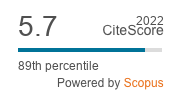Edible insects are receiving attention as a protein source in the food and feed sector. However, successful commercialisation requires mass production matched with appropriate processing and storage techniques. The quality of dried and pulverised black soldier fly larvae stored in woven polypropylene (PP) sacks, polyethylene (PE) bags and plastic containers with screw lid (PL) in ambient and refrigerated environments was monitored over six months. Chemical indicators (oxidation, fatty acid profile), microbiological parameters (total viable counts, yeast and moulds, Enterobacteriaceae, presumptive coliforms, Salmonella) and colour change were examined. Temperature and relative humidity of the storage environments were monitored. In the ambient environment (temperature: 23.6±2.7 °C; relative humidity: 57.6±7.0%), chemical deterioration progressed 1.5 and 1.2 times faster in PP and PE, respectively, compared to PL. Refrigeration (temperature: 5.4±1.1 °C; relative humidity: 97±5.7%) exacerbated spoilage in the PP due to permeation of moisture through the woven strands, but slowed chemical deterioration by factors of 3.3 (PL) and 2.8 (PE). Likewise, based on the average counts of Enterobacteriaceae and yeast and moulds, microbiological deterioration progressed 2.1 and 1.4 times faster in the PP and PE, respectively, while refrigeration retarded build-up of microbial loads by factors of 1.3-9.6. The presence of Salmonella spp. in the experimental product indicates that due attention must be given to adequacy of processing and handling procedures for dried black soldier fly meal.
RESEARCH ARTICLE
Changes in chemical and microbiological quality of semi-processed black soldier fly (Hermetia illucens L.) larval meal during storage
E. Kamau Related information
1Department of Food Science and Technology, Jomo Kenyatta University of Agriculture and Technology, Nairobi, Kenya.
, C. Mutungi Related information2International Institute of Tropical Agriculture (IITA), Mikocheni Light Industrial Area, Dar es Salaam, Tanzania.
*Corresponding author: chrismutungi@yahoo.
, J. Kinyuru Related information*Corresponding author: chrismutungi@yahoo.
1Department of Food Science and Technology, Jomo Kenyatta University of Agriculture and Technology, Nairobi, Kenya.
, S. Imathiu Related information1Department of Food Science and Technology, Jomo Kenyatta University of Agriculture and Technology, Nairobi, Kenya.
, H. Affognon Related information3West and Central African Council for Agricultural Research for Development (CORAF), Dakar, Senegal.
, S. Ekesi Related information4International Centre of Insect Physiology and Ecology, Nairobi, Kenya.
, D. Nakimbugwe Related information5Department of Food Technology and Nutrition, School of Technology, Nutrition and Bio-Engineering, Makerere University, Kampala, Uganda.
, K.K.M. Fiaboe Related information6International Institute of Tropical Agriculture (IITA), Yaoundé, Cameroon.
Journal of Insects as Food and Feed: 6
(4)- Pages: 417 - 428
Published Online: April 17, 2020
Abstract
Keywords: edible insects, entomophagy, processing, packaging, shelf-life
2022 Journal Impact Factor
5.7
source: Journal Impact Factor 2023™ from Clarivate™

Institutional Offers
For institutional orders, please contact [email protected].
Purchase Options
-
G. Daş, M.M. Seyedalmoosavi, K. Schleifer, M. Mielenz and C.C. Metges
-
-
M. Barrett, S.Y. Chia, B. Fischer and J.K. Tomberlin
-
D.G.A.B. Oonincx and M.D. Finke
-
G. Bosch and K.S. Swanson
-
K.B. Barragan-Fonseca, M. Dicke and J.J.A. van Loon
-
A. van Huis
-
M. Tschirner and A. Simon
-
S. Kelemu, S. Niassy, B. Torto, K. Fiaboe, H. Affognon, H. Tonnang, N.K. Maniania and S. Ekesi
-
S. Diener, C. Zurbrügg and K. Tockner
Call for papers: Application of insect ingredients in sustainable aquaculture



